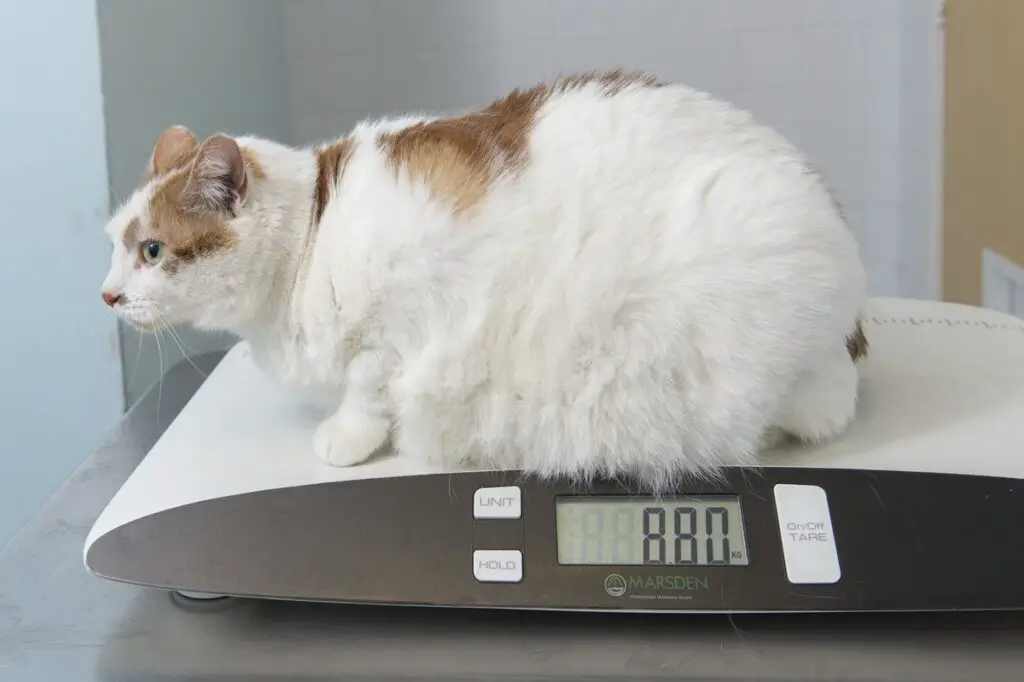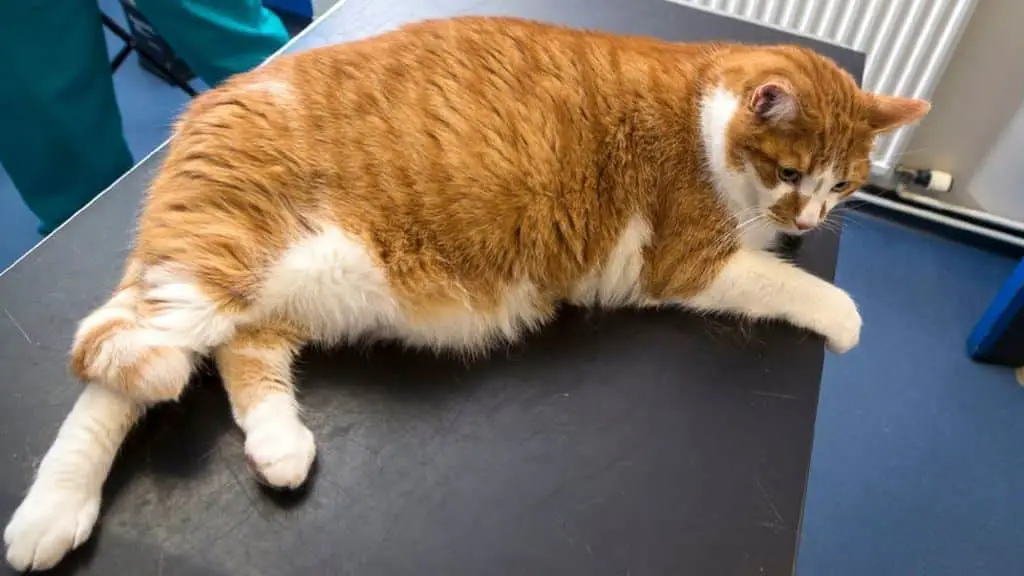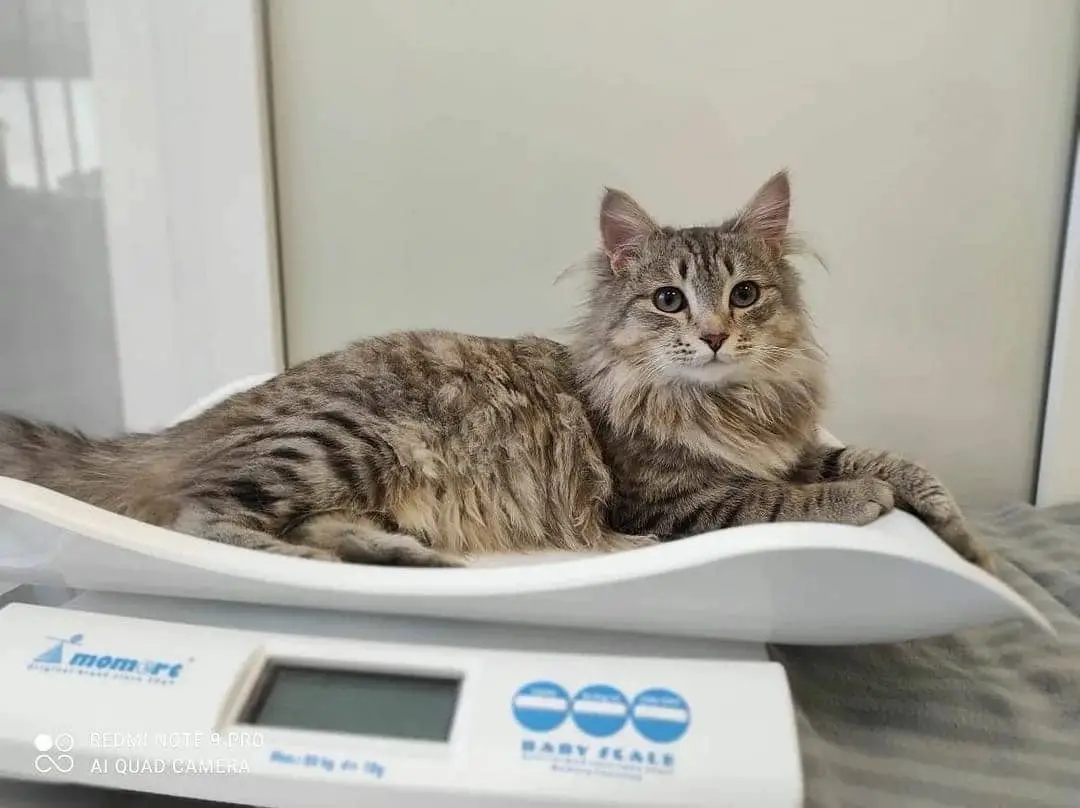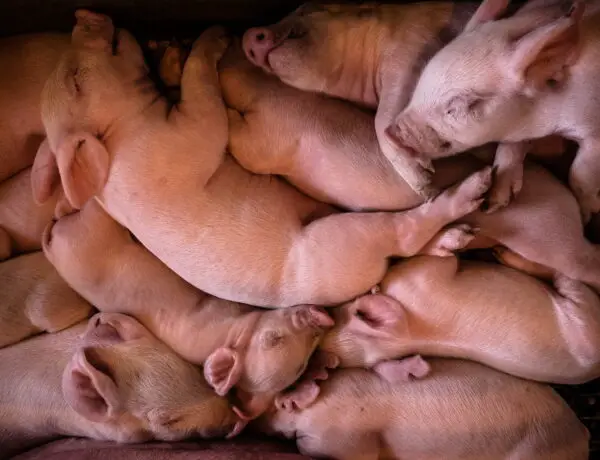Introduction
How Much Does The Average Cat Weigh: When it comes to our feline friends, one question that often comes to mind is, “How much does the average cat weigh?” Cats come in all shapes and sizes, from petite and dainty to big and muscular. Understanding the average weight of a cat can help us gauge whether our own furry companions are within a healthy range or if they may need some extra attention.
Weight is an important factor in a cat’s overall health and well-being. Just like humans, cats can be underweight or overweight, and both extremes can lead to various health issues. The average weight of a cat can vary depending on several factors, including breed, age, and gender. Generally, adult cats tend to weigh between 7 and 12 pounds, with males typically being larger and heavier than females.
However, it’s important to note that these numbers are just averages, and there can be significant variations within each breed. For example, some large breeds, such as Maine Coons, can weigh up to 25 pounds or more, while smaller breeds, like Siamese cats, may weigh as little as 5 pounds. Additionally, factors such as genetics, diet, and lifestyle can also influence a cat’s weight.
Monitoring your cat’s weight is crucial for their overall health. If your cat is consistently gaining or losing weight, it may be a sign of an underlying health issue. Obesity, in particular, is a common problem among cats and can lead to a range of health problems, including diabetes, arthritis, and heart disease. On the other hand, being underweight can indicate malnutrition or an underlying medical condition.

Is 5kg heavy for a cat?
Ideal Cat Weight Based on Breed:Domestic cat – 3.5 to 4.5 kg. Siamese – 2.2 to 4.5 kg. Persian – 3 – 5.5 kg. Maine Coon – 4.5 to 11 kg.
Whether 5kg is considered heavy for a cat depends on various factors such as the breed, age, and overall health of the cat. Cats come in different sizes and weights, so what may be heavy for one cat may be normal for another. It is important to consider these factors when determining if 5kg is heavy for a cat.
Breed: Different cat breeds have different average weights. For example, the Maine Coon breed is known for its large size and can weigh up to 8-10kg on average. On the other hand, smaller breeds like the Siamese or Abyssinian tend to weigh around 3-4kg. Therefore, a 5kg weight may be considered heavy for a smaller breed but not necessarily for a larger breed.
Age: The weight of a cat can also vary depending on its age. Kittens tend to weigh less than adult cats, and as they grow, their weight increases. A 5kg weight may be considered heavy for a young kitten but normal for an adult cat. It is important to monitor a cat’s weight as it grows to ensure it is within a healthy range.
Overall Health: The overall health of a cat can also affect its weight. Cats that are overweight or obese may have a higher weight than what is considered normal for their breed and age. On the other hand, cats that are underweight may have a lower weight. It is important to consult with a veterinarian to determine if a cat’s weight is healthy and if any dietary or lifestyle changes are necessary.
whether 5kg is heavy for a cat depends on various factors such as breed, age, and overall health. It is important to consider these factors and consult with a veterinarian to determine if a cat’s weight is within a healthy range.”
How much do cats weigh in kg?
HOW MUCH DOES AN AVERAGE CAT WEIGH? While the average weight for a typical cat is around ten pounds (roughly 4.5kg), cats’ weights can vary based on breed, lifestyle and age.
Cats come in various shapes and sizes, and their weight can vary significantly depending on factors such as breed, age, and overall health. While it is difficult to provide an exact weight for all cats, there is a general range that can give you an idea of what to expect.
On average, domestic cats weigh between 4 to 5 kilograms (8.8 to 11 pounds). However, it is important to note that this is just an average, and there are cats that can weigh more or less than this range. Some larger breeds, such as Maine Coons, can weigh up to 9 kilograms (20 pounds) or more, while smaller breeds like Siamese cats may weigh around 2 to 3 kilograms (4.4 to 6.6 pounds).
When it comes to determining a cat’s weight, it is essential to consider their body condition as well. A healthy cat should have a well-proportioned body with a visible waistline when viewed from above. You should be able to feel their ribs without excess fat covering them, but they should not be overly prominent.
If you are unsure about your cat’s weight, it is always a good idea to consult with a veterinarian. They can assess your cat’s overall health and provide guidance on maintaining a healthy weight. Additionally, they can help you create a diet and exercise plan tailored to your cat’s specific needs.
Remember that weight can fluctuate throughout a cat’s life, so regular monitoring is important. If you notice any sudden or significant changes in your cat’s weight, it is best to seek veterinary advice to rule out any underlying health issues.
What is a normal size cat weight?
It varies depending on the breed but for most domestic cats, you can take 10 pounds (4-4.5 kg) as an ideal weight. Certain larger breeds can weigh as much as 25 pounds (11 kg) and smaller breeds can weigh as little as 5 pounds (2.2 kg).
A normal size cat weight can vary depending on the breed, age, and overall health of the cat. However, on average, most domestic cats weigh between 8 and 10 pounds (3.6 to 4.5 kilograms). It is important to note that this is just a general range and there can be variations within different cat breeds.
Factors such as genetics, diet, and exercise can also play a role in determining a cat’s weight. Some cat breeds, such as the Maine Coon or the Ragdoll, are naturally larger and can weigh up to 20 pounds (9 kilograms) or more. On the other hand, smaller cat breeds like the Siamese or the Abyssinian tend to be lighter, weighing around 6 to 8 pounds (2.7 to 3.6 kilograms).
It is essential to monitor a cat’s weight to ensure they are maintaining a healthy size. Obesity in cats can lead to various health issues, including diabetes, heart disease, and joint problems. On the other hand, being underweight can also indicate underlying health problems or malnutrition.
If you are unsure about your cat’s weight, it is best to consult with a veterinarian. They can assess your cat’s overall health and provide guidance on maintaining an appropriate weight. Regular check-ups and monitoring your cat’s diet and exercise can help prevent weight-related issues and ensure your cat remains healthy and happy.
How much should a cat eat a day?
As a general average, if you are feeding a commercially produced high-quality dry food with a good quality protein source, then an indoor cat would be fed about 1/3 to 1/2 cup of food per day. This amount of quality food is approximately between 167–250 calories.
When it comes to feeding our feline friends, it’s important to strike the right balance. Cats have unique dietary needs, and providing them with the appropriate amount of food is crucial for their overall health and well-being. So, how much should a cat eat a day?
The answer to this question depends on several factors, including the cat’s age, weight, activity level, and overall health. Kittens, for example, require more calories than adult cats because they are still growing and developing. On the other hand, senior cats may have slower metabolisms and may need fewer calories to maintain a healthy weight.
It’s also important to consider the type of food you are feeding your cat. Dry cat food tends to be more calorie-dense than wet food, so cats may need to eat less of it to meet their nutritional needs. However, wet food can be a good option for cats who struggle to stay hydrated, as it contains more moisture.
One way to determine how much food your cat should eat is to follow the feeding guidelines provided by the manufacturer of the cat food you are using. These guidelines typically recommend a certain amount of food based on the cat’s weight. However, it’s important to remember that these guidelines are just a starting point and may need to be adjusted based on your cat’s individual needs.
Monitoring your cat’s weight and body condition is also important in determining the appropriate amount of food to feed. If your cat is gaining weight, you may need to reduce their portion sizes. Conversely, if your cat is losing weight or appears to be hungry all the time, you may need to increase their food intake.
Can I feed my cat 3 times a day?
“From age six months to maturity, most cats will do well when fed two times a day.” Once the cat becomes an adult, at about one year, feeding once or twice a day is appropriate in most cases. Senior cats, age seven and above, should maintain the same feeding regimen.
Feeding your cat is an essential part of being a responsible pet owner. It is important to provide your feline friend with the right amount of food and ensure they are getting the necessary nutrients. One common question that cat owners have is how many times a day they should feed their cat. While there is no one-size-fits-all answer to this question, it is generally recommended to feed your cat multiple times a day.
Feeding your cat multiple times a day can help mimic their natural feeding behavior in the wild. Cats are natural hunters and would typically eat multiple small meals throughout the day. By feeding your cat multiple times a day, you are providing them with a more natural eating pattern and helping to prevent overeating or binge eating.
Additionally, feeding your cat multiple times a day can help prevent obesity and promote a healthy weight. Cats that are fed only once or twice a day may be more prone to overeating during meal times, leading to weight gain. By splitting their daily food intake into smaller, more frequent meals, you can help regulate their appetite and prevent them from becoming overweight.
Feeding your cat multiple times a day can also help prevent digestive issues. Cats that are fed large meals infrequently may be more prone to digestive problems such as vomiting or diarrhea. By spreading out their meals throughout the day, you are giving their digestive system a chance to properly process and absorb the nutrients from their food.
It is important to note that the number of times you should feed your cat may vary depending on their age, health, and individual needs. Kittens, for example, may require more frequent feedings as they have smaller stomachs and higher energy needs. Older cats or cats with certain health conditions may also require a specific feeding schedule recommended by their veterinarian.
What is the average weight of a cat?
The average weight of a cat can vary depending on various factors such as breed, age, and overall health. On average, adult cats typically weigh between 7 to 12 pounds (3.2 to 5.4 kilograms). However, it is important to note that this is just a general range and there can be significant variations within different cat breeds.
Some larger cat breeds, such as Maine Coons, can weigh up to 25 pounds (11.3 kilograms) or more, while smaller breeds like Siamese cats may weigh around 5 to 7 pounds (2.3 to 3.2 kilograms). Additionally, factors like gender and whether the cat is neutered or spayed can also influence their weight.
It is crucial to remember that these are average weights and individual cats may fall outside of this range. If you have concerns about your cat’s weight, it is always best to consult with a veterinarian who can provide personalized advice and guidance based on your cat’s specific needs.
How much does a typical cat weigh?
A typical cat weighs around 8 to 10 pounds (3.6 to 4.5 kilograms). However, it is important to note that the weight of a cat can vary depending on various factors such as breed, age, and overall health. Some cat breeds tend to be larger and heavier than others, while older cats may weigh less due to muscle loss and decreased activity levels.
It is also worth mentioning that male cats are generally larger and heavier than female cats. Male cats can weigh anywhere between 10 to 12 pounds (4.5 to 5.4 kilograms) on average, while female cats typically weigh slightly less, ranging from 8 to 10 pounds (3.6 to 4.5 kilograms).
It is important to monitor your cat’s weight and consult with a veterinarian if you notice any significant changes. Maintaining a healthy weight is crucial for a cat’s overall well-being and can help prevent various health issues such as obesity and joint problems.
Can you provide information on the average weight of cats?
The average weight of cats can vary depending on various factors such as breed, age, and overall health. On average, adult cats typically weigh between 7 to 12 pounds (3.2 to 5.4 kilograms). However, it is important to note that this is just a general range and there can be significant variations within different cat breeds.
Breed: Different cat breeds have different average weights. For example, larger breeds like Maine Coons can weigh anywhere between 10 to 25 pounds (4.5 to 11.3 kilograms), while smaller breeds like Siamese cats may weigh around 6 to 10 pounds (2.7 to 4.5 kilograms).
Age: The weight of a cat can also change throughout its life. Kittens are usually born weighing around 3 to 4 ounces (85 to 113 grams) and can gain about 1 pound (0.45 kilograms) per month during their first few months. As cats reach adulthood, their weight stabilizes, and they may gain or lose weight depending on their diet and activity levels.
the average weight of cats is typically between 7 to 12 pounds (3.2 to 5.4 kilograms), but this can vary based on factors such as breed and age. It is important to monitor your cat’s weight and consult with a veterinarian if you have any concerns about their health or weight management.
What is the general weight range for cats?
The general weight range for cats can vary depending on various factors such as breed, age, and overall health. On average, adult cats typically weigh between 7 to 12 pounds. However, it is important to note that this is just a general range and there can be exceptions. Some larger cat breeds, like Maine Coons, can weigh up to 20 pounds or more, while smaller breeds like Siamese cats may weigh around 5 to 7 pounds.
When it comes to kittens, their weight can vary greatly as they go through their growth stages. Newborn kittens usually weigh around 3 to 4 ounces and then gain weight rapidly during their first few weeks. By the time they are around 8 weeks old, kittens can weigh anywhere between 1.5 to 2 pounds. As they continue to grow, their weight will gradually increase until they reach their adult size.
Do you have any data on the average weight of domestic cats?
Yes, we have data on the average weight of domestic cats. According to various studies and surveys, the average weight of domestic cats typically ranges between 8 to 10 pounds (3.6 to 4.5 kilograms). However, it is important to note that this is just an average and individual cat weights can vary significantly depending on factors such as breed, age, sex, and overall health.
Breed: Different cat breeds have different average weights. For example, larger breeds like Maine Coons can weigh anywhere between 10 to 25 pounds (4.5 to 11.3 kilograms), while smaller breeds like Siamese cats may weigh around 6 to 10 pounds (2.7 to 4.5 kilograms).
Age: The weight of a cat can also vary with age. Kittens are generally lighter, weighing around 1 to 1.5 pounds (0.45 to 0.68 kilograms) at birth, and they gradually gain weight as they grow. Adult cats usually reach their full weight by the age of 1 to 2 years.
Sex: Male cats tend to be larger and heavier than female cats. Neutered or spayed cats may also have a tendency to gain more weight due to changes in metabolism.
Overall Health: The overall health and lifestyle of a cat can also impact its weight. Cats that are well-nourished and receive regular exercise are more likely to maintain a healthy weight, while those that are overfed or sedentary may become overweight or obese.
the average weight of domestic cats is typically between 8 to 10 pounds (3.6 to 4.5 kilograms), but this can vary depending on factors such as breed, age, sex, and overall health. It is always important to consult with a veterinarian to ensure that your cat is maintaining a healthy weight and to address any concerns regarding their weight.

Conclusion
The average weight of a cat can vary depending on various factors such as breed, age, and overall health. However, on average, domestic cats tend to weigh between 8 to 10 pounds. It is important to note that this is just an average and there can be significant variations among individual cats.
The weight of a cat is influenced by its breed. Some breeds, such as the Maine Coon, can weigh up to 25 pounds, while others, like the Siamese, are generally smaller and weigh around 6 to 8 pounds. Additionally, the age of a cat can also affect its weight. Kittens are typically lighter, weighing around 1 to 2 pounds at birth, and gradually gain weight as they grow. Adult cats usually reach their full weight by the age of 1 to 2 years.
Furthermore, the overall health and lifestyle of a cat can impact its weight. Cats that are well-nourished and receive a balanced diet are more likely to maintain a healthy weight. On the other hand, cats that are overfed or have a sedentary lifestyle may become overweight or obese. It is important for cat owners to provide their pets with a nutritious diet and engage them in regular physical activity to ensure they maintain a healthy weight.
while the average weight of a cat is around 8 to 10 pounds, it is important to consider individual factors such as breed, age, and overall health. Monitoring a cat’s weight and ensuring they receive proper nutrition and exercise is crucial for their overall well-being. If you have concerns about your cat’s weight, it is always best to consult with a veterinarian who can provide personalized advice and guidance.
Discover the average weight of cats and learn why it varies. Find out how to keep your feline friend healthy and maintain their ideal weight.





No Comments